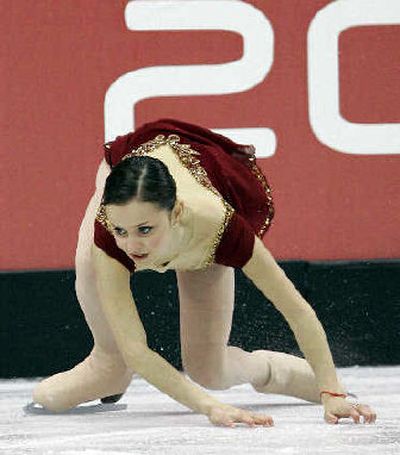Sasha’s golden mettle

TURIN, Italy – There was no way to prettify it. Everyone fell. On such a night, when the Olympic gold medal in figure skating went to practically the only woman left standing, it seemed right that silver was awarded to the one who did the best job of getting back up again.
There will be a lot of argument as to whether Sasha Cohen deserved her medal. But there is none here. Cohen didn’t skate well in the women’s long program at the Palavela and she virtually donated the gold medal to Shizuka Arakawa of Japan. But there was something worthwhile, memorable even, in Cohen’s performance anyway. It’s not often an athlete watches her heart fall out onto the ice, but finds a way to pick it back up again.
Cohen fell in warm-ups. She fell on her first triple jump of the night, a lutz, when she lost her balance and landed on the back of her exquisite little burgundy dress. And then she almost fell again, on a triple flip, when she staggered and put both hands on the ice. But somehow Cohen managed to steady herself on that ice, so scarred with skid marks, and stayed upright.
From that moment on, she began counterpunching. The triples began landing cleanly, like uppercuts. Triple loop. Triple flip. Triple toe. And then two more triple salchows. Five triple jumps in all, before she ended her four-minute free program, and skated to the sideboard where she mouthed something to her coach, John Nicks, that looked like, “I tried.”
No one would land more triples among the final group of contenders. Not Arakawa, and not the bronze medalist Irina Slutskaya of Russia, who fell hard on her own triple flip, and also skipped other planned jumps.
“I was able to take one step at a time. I was able to believe when everything looked a little dark and gray,” Cohen said.
The fact that skaters wear mock evening gowns makes it hard to appreciate what Cohen did. Maybe if her knees were bloody. Maybe if she wasn’t such a royal figure in her garnet and gold dress, and maybe if the score of “Romeo and Juliet” hadn’t been playing while she was working, it would be easier to convey the grit of her performance. Think of it this way: How often does a quarterback throw two interceptions in the first quarter but come back to throw three touchdowns and make the playoffs? What Cohen did was something similar.
She was fortunate, of course, that most of her rivals skated poorly. “I think it was a gift,” Cohen acknowledged. But in that light, Cohen’s refusal to give up was all the more critical, and instructive.
It partially redeems what has been a frustrating pattern of losses for her. In several major competitions now, Cohen has gone into the free skate as the leader, only to yield medals by falling. She has lost two national titles this way. At the Salt Lake Olympics in 2002, she was in third place after the short program, but failed to medal when she tripped up. She won the short program at the 2004 World Championships, but two-footed a triple in the free skate to lose the gold.
In the short program earlier this week, she laid down a little bit of near-perfection on the ice, to stand in first place. She was ebullient afterward, and it seemed all of her old habits were forgotten. But she turned reclusive on Wednesday, skipping two practice sessions to stir rumors that she was injured. According to Nicks, she was simply tired and balked at returning to the ice.
Cohen has changed coaches three times and moved from California to New York and back again, in an attempt to cure her bouts with nerves, and solidify her skating. Finally, she returned to her first coach, Nicks, who seems to best understand and accept her temperament. “Sasha Cohen, moody?” he said earlier this week, with gentle sarcasm.
It may be that something inside Cohen is temperamentally unsuited to the compressed tensions of figure skating performances. An Olympic gold medal is a single opportunity that is just four minutes long, and which only comes every four years. But it has been fascinating to watch Cohen try to cure herself of her competitive vulnerability.
All Olympic athletes talk about delivering their personal bests. But the fact is, it’s a hard thing to offer up on command in the cooker of an arena with a gold medal at stake, and Cohen couldn’t quite do it. But she can take home something else, and that is the personal knowledge she acquired in those terrible four minutes, the knowledge that while she fell, she would not quit.
“I think as a person I matured,” she said. “I was strong through it all. I’m happy with it and just really ecstatic to come home with a medal.”
Personally, the next time I skid out on a patch of bad ice, I hope I recover with half the heart.